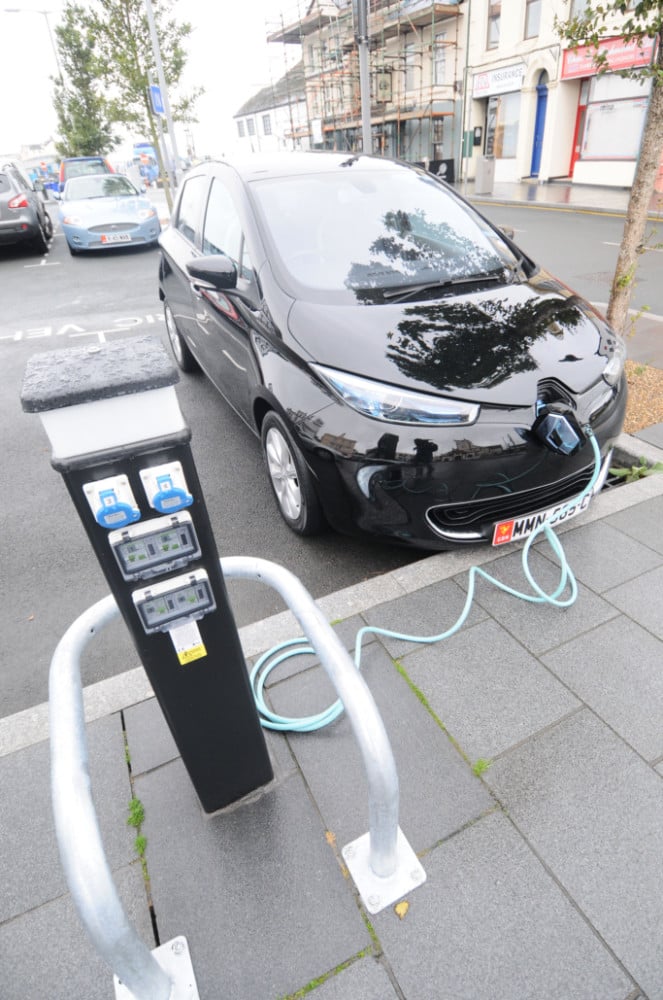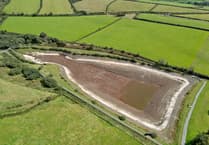It's becoming increasingly common to see electric cars on the island's roads. In the future, will 100% of Manx vehicles be electric? KERRY SHARPE reports.Are electric vehicles the way forward for island motorists?
Passing my neighbour’s driveway last week, there it was again: the cute little Nissan Leaf, quietly being re-charged, its giant plug just visible from beneath its bonnet flap, the electric cable snaking its way into my neighbour’s house.
It made me smile. Not that I think my neighbour’s car is in any way ridiculous, you understand. But the fact that by plugging your car into the mains, you can make it go again (and again and again) is the stuff of every child’s dreams.
Remember driving the mini electric cars at Onchan Park as a toddler? All you needed was a 10p for the slot and the circuit was yours. Maybe it’s that joyful childhood memory but there’s something about electric cars which makes my inner child stomp its feet and shout: ’I want one’!
Which got me thinking: what if we could only buy electric cars in the Isle of Man? We set our own laws after all. How easy would it be for our island to go 100% electric?
In terms of geography, we’re sorted. The island is 30 miles by 13 and the average electric car’s battery will last a hundred miles before it runs out. Free charging points are available at Chester Street car park in Douglas, Ramsey’s Market Square and swimming pool, Port Erin Commissioners’ office and the Quay car park in Castletown.
Manx Utilities offers a reduced, overnight tariff for electric vehicle (EV) owners so charging an EV’s battery from fully flat (which is rarely the case in the Isle of Man) costs just £2.60. Prices for electric cars have also reduced in recent years. A 2015 used Nissan Leaf, for example, costs £14 000 which is the same price as a 2015 Nissan Qashqai.
The Manx government has introduced an incentive for EV owners, meaning from April 2017, EVs incur zero road tax.
Andrew Wilson of Athol Garage said: ’The Isle of Man could lead the way in terms of electric vehicles.
’Some 25 to 30% of our sales over the past six months have been used Nissan Leafs. We’ve sold 21 in just the past six weeks’.
This increase in EV sales in the island reflects a bigger, global picture. In Norway, for example, nearly a third of all new cars sold are electric, which is the highest number of electric cars per head of the population in the world.
This thirst for EVs has been driven by the Norwegian government which, since the 1990s, has offered all kinds of incentives to increase EV uptake. Norwegians don’t pay VAT on EVs; EV owners get free parking, are allowed to drive in bus lanes and can recharge their vehicles freely at numerous high-speed charging points.
Dan Brook, who lives in Ramsey, has set up the website EVIOM (Electric Vehicles Isle of Man) in order to share stories and advice with fellow EV owners.
Although a committed EV owner, Dan believes the Isle of Man could be doing more to encourage EV use.
’The charging points in Chester Street, for example, only offer two sockets for the whole of Douglas,’ says Dan.
’And even if you manage to get a space, they’re not proper charging units’.
He describes the units in Chester Street as more akin to ’hook-ups at caravan sites’.
Fully re-charging an electric car battery here would take, he estimates, between eight and nine hours. Instead, owners opt for specialist units at home which cost around £400 to buy and install.
Government grants are also non-existent in the island. In the UK the government offers garages grants of up to £4,500 on each new electric car, therefore lowering the price for the buyer.
Anyone wanting to buy a new electric car in the Isle of Man is effectively forced to buy one in the UK.
So how committed is the Isle of Man to encouraging the use of electric cars?
Kristian Cowin, from the Department of Environment, Food and Agriculture said: ’Currently there are no plans to introduce grants although the old-style charging units are due to be replaced with high speed units’.
Isle of Man policy does state that all surface transport will be virtually emission-free by 2050, which is in line with UK policy.
Of course, it might soon be the case that the only cars available on the market will be EVs. Volvo has already committed to building only EVs by 2019.
Manx Utilities executive director Adrian Dobbins said: ’This is not something we are ignoring and it’s something we have been discussing with the Department of Infrastructure for a long time. It’s a very exciting area. There are a lot of positives but lots of questions to answer along the way’.
It seems it’s not just a case of installing more charging units. The whole concept of electric cars is inextricably tied up with the island’s future energy plans.
After all, EVs have to get their power source from somewhere and that somewhere is currently a power station which burns gas.
Adrian talks of the possibility of ’super inter-connection’ where big circuits may be built across the globe, potentially allowing more remote areas like the Isle of Man to tap into alternative energy sources.
So to answer my original question: ’Could the island go 100% electric?’ The answer, says Adrian, is a resounding yes. ’The network is well able to cope,’ he said.
But the reality is that it will just take some time.

.jpeg?width=209&height=140&crop=209:145,smart&quality=75)



Comments
This article has no comments yet. Be the first to leave a comment.